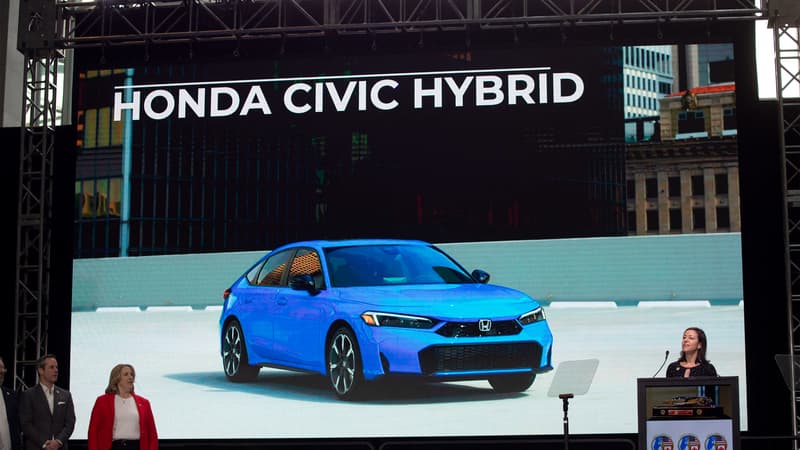The Japanese car manufacturer Honda announced Wednesday to relocate from Japan to the United States the production of its civic hybrid motorization car, whose export of the archipelago is now subject to US customs customs in 25%.
This announcement occurs when the Japanese Minister of Economic Revitalization, Ryosei Akazawa, begins the negotiations in Washington on Wednesday to try to find a commitment in customs tasks. “We are going to relocate the production (of this model) to the United States” in the Honda factory in Indiana, and “the production will cease (in the Saitama factory in Japan) around June or July,” said a group spokesman.
This decision is not “motivated by a unique reason, it is based on the company’s policy since its creation, which consists of producing cars where demand is strong,” he insisted on the spokesman, refusing to attribute this change to the customs offensive.
In total, Honda produced a little more than one million cars in its 12 factories in the United States last year. But, nevertheless, exported 5,379 vehicles in Japan, from the civic Hybdride. However, Honda is also exposed to 25% American customs surcharge that has been reaching US imports of spare parts for cars and cars for a few weeks.
“The strength of Honda is its solid presence and local production in the United States. Its weakness is that its flagship model, the SUV CR-V, is manufactured in Canada,” and therefore taxed, said Christopher Richter, an analyst at the CLSA company, during a presentation on Tuesday, in a 20% decrease in the manufacturer’s operational profits.
Nissan also reviews its production plans in the United States
For his part, his Japanese rival Nissan announced in early April that he was going to review his production plans in the United States to maintain volumes “exempt from customs rights” and stop marketing two SUV models produced in Mexico in the country. Japan has failed to obtain exemption from the US automotive surcharge, or for steel and aluminum. The “reciprocal” surcharge of 24% imposed on Japanese products is certainly suspended for 90 days, but the 10% capture law is applied.
Ryosei Akazawa would meet in Washington this week, the US Treasury secretary, Scott Besent, and the trade representative, Jamieson Greer. “I am convinced that we can establish a relationship of trust and carry out good negotiations that will lead to a win-win relationship,” he told the press on Wednesday. Tokyo could impose a greater purchase of Alaska natural gas and American defense teams in the balance, analysts said.
Diplomatic Test “First Real”
The Japanese Daiwa Research Institute warned Wednesday that US customs duties “in 24%, if applied, could lead to a 1.8% drop in Japan GDP by 2029.
Delegations of Ministers of South Korea or Indonesia are also expected in Washington in the next few days to discuss possible commercial commitments. But the discussions with Japan, a nearby ally of Washington and the main source of foreign investments in the United States, “appear as the first real evidence of this diplomacy of carrot and stick,” observes Stephen Innes, of the ISF asset management cabinet.
“It is the canary in the coal mine: if Japan reaches an agreement, even half concluded, perspectives are described (for other countries). If you leave empty hands, other nations will begin to favor confrontation,” he warned.
Source: BFM TV


